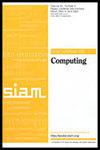并行次模函数最小化与矩阵相交的多项式轮数下界
IF 1.6
3区 计算机科学
Q3 COMPUTER SCIENCE, THEORY & METHODS
引用次数: 0
摘要
次模函数最小化(SFM)和矩阵相交是基本的离散优化问题,在许多领域都有应用。众所周知,这两个问题都可以通过查询相关的oracle(用于SFM的评估oracle和用于矩阵交集的rank oracle)来解决,其中表示宇宙大小。然而,所有已知的多项式查询算法都是高度自适应的,至少需要查询oracle几轮。一个自然的问题是,这些问题是否可以以高度并行的方式有效地解决,即使用仅使用多对数轮自适应的查询。最近,Balkanski和Singer的工作向理解高效并行SFM所需的自适应迈出了重要的一步,他们表明,任何SFM算法进行查询都必然需要轮询。这使得在多对数轮中使用有效的SFM算法成为可能。对于矩阵相交,即使是恒圆的可能性,查询算法也不排除。在这项工作中,我们证明了任何(可能是随机的)用于子模函数最小化或矩阵交叉查询的算法都需要(在整篇论文中,我们使用通常的惯例,即使用to表示和使用to表示某些未指定常数)自适应轮。事实上,我们展示了一个多项式下界的自适应轮数,即使是对任何常数进行最多查询的算法。因此,即使SFM和矩阵相交是有效可解的,它们在oracle模型中也不是高度并行化的。本文章由计算机程序翻译,如有差异,请以英文原文为准。
A Polynomial Lower Bound on the Number of Rounds for Parallel Submodular Function Minimization and Matroid Intersection
Submodular function minimization (SFM) and matroid intersection are fundamental discrete optimization problems with applications in many fields. It is well known that both of these can be solved making queries to a relevant oracle (evaluation oracle for SFM and rank oracle for matroid intersection), where denotes the universe size. However, all known polynomial query algorithms are highly adaptive, requiring at least rounds of querying the oracle. A natural question is whether these can be efficiently solved in a highly parallel manner, namely, with queries using only polylogarithmic rounds of adaptivity. An important step towards understanding the adaptivity needed for efficient parallel SFM was taken recently in the work of Balkanski and Singer who showed that any SFM algorithm making queries necessarily requires rounds. This left open the possibility of efficient SFM algorithms in polylogarithmic rounds. For matroid intersection, even the possibility of a constant round, query algorithm was not hitherto ruled out. In this work, we prove that any, possibly randomized, algorithm for submodular function minimization or matroid intersection making queries requires (Throughout the paper, we use the usual convention of using to denote and using to denote for some unspecified constant ) rounds of adaptivity. In fact, we show a polynomial lower bound on the number of rounds of adaptivity even for algorithms that make at most queries for any constant . Therefore, even though SFM and matroid intersection are efficiently solvable, they are not highly parallelizable in the oracle model.
求助全文
通过发布文献求助,成功后即可免费获取论文全文。
去求助
来源期刊

SIAM Journal on Computing
工程技术-计算机:理论方法
CiteScore
4.60
自引率
0.00%
发文量
68
审稿时长
6-12 weeks
期刊介绍:
The SIAM Journal on Computing aims to provide coverage of the most significant work going on in the mathematical and formal aspects of computer science and nonnumerical computing. Submissions must be clearly written and make a significant technical contribution. Topics include but are not limited to analysis and design of algorithms, algorithmic game theory, data structures, computational complexity, computational algebra, computational aspects of combinatorics and graph theory, computational biology, computational geometry, computational robotics, the mathematical aspects of programming languages, artificial intelligence, computational learning, databases, information retrieval, cryptography, networks, distributed computing, parallel algorithms, and computer architecture.
 求助内容:
求助内容: 应助结果提醒方式:
应助结果提醒方式:


